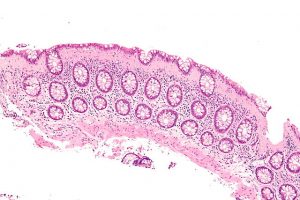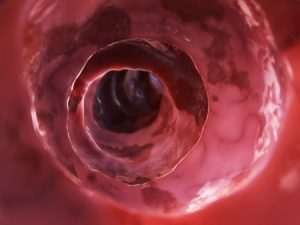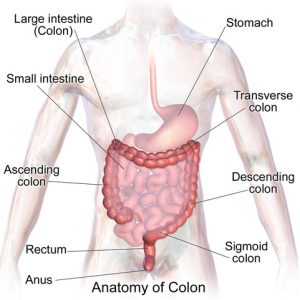What is Inflamed Colon?
Page Contents
Inflamed colon known as Colitis in medical terms is a disorder caused in the intestines (both large & small intestines) that cause abnormalities and bowel diseases.
Types of Inflamed Colon
Crohn’s disease
A part of the gastrointestinal tract gets inflamed by this type of colitis. The tail end of the small intestine is mostly affected, but it can affect all the layers of the bowel. It causes inflammation and creates patches across different parts of the digestive tract.
Ulcerative colitis
It acutely affects the large intestine causing the lining of the colon to develop ulcers and sores that excrete pus and mucus at times. It causes inflammation in the intestine and abdominal discomfort. It also causes a continuous inflammation in one particular area and results to affect deeper into the intestine.
Diverticulitis
It occurs when the outer lining of the bowel pouches out through the layers of the spots present in the muscles of the intestinal wall. As a result of this, inflammation or infection is caused in the digestive tract. The small pores face obstruction from parts of stool and other infectious materials. The nearest tissue of the colon present on the left-hand side is inflamed and thereby causes pain and even fever. However, this can be treated by antibiotics. If not treated through medication, the condition worsens further leading to leakage of the colon and moreover blockage of the bowel. In that case, surgery is a must to remove the affected area of the intestine.
Antibiotic-Associated Colitis
The colon usually consists of natural and healthy bacteria. Intake of antibiotics for treatment of any disease might kill these useful bacteria thereby allowing the other harmful bacteria to affect the colon causing inflammation. The most common type is named Clostridium difficile and it generates the disease called antibiotic-associated colitis. In case it is mild, it may be healed by taking metronidazole orally. In moderate cases, it can be treated by vancomycin which is also taken orally. But in acute conditions, the patient should be medicated with a mixture of oral vancomycin and metronidazole generated through a vein and vancomycin enemas. But when it comes to more severe issues such as bowel rupture, surgery is advised. Again, some complicated cases of this disease can be overcome by fecal pellets donated to the patient.
Chemical Colitis
When chemicals get inserted into the colon, the colon gets inflamed, and major damages can occur. The mucosal lining of the colon might also get inflamed when reacted to strong chemicals.
Medication-associated colitis
Inflamed colon can also be the effect of intake of several medicines such as NSAIDs (nonsteroidal anti-inflammatory drugs), mycophenolate, ipilimumab and retinoic acid.
Causes of Inflamed Colon

Collagenous colitis intermed mag (Inflamed colon)
Colitis tends to occur more in younger people than the aged ones. The major causes are as follows:
- Bacteria: One of the vital causes, most of these enter the human body through food and causes disorders, food poisoning or other stomach infections.
- Parasite infections: A significant cause of infectious colitis, it mainly occurs due to contamination of water. Infected water causes serious issues.
- Pseudomembranous colitis: Mainly caused by a specific bacterial infection known as Clostridium. People taking antibiotics or admitted at the hospitals tend to suffer from this kind of colitis. Most antibiotics kill the good bacteria and replace them with the Clostridium bacteria causing diarrhea along with fever.
- Lack of Supply of Blood: Arteries which supply blood to the colon sometimes tend to narrow themselves. As a result, the required amount of blood fails to enter the colon causing inflammation. Lack of blood supply in the human body can cause abnormal bowel movements containing blood, abdominal pain and also fever.
Symptoms of Inflamed Colon
- Fever sometimes accompanied with chills
- Frequent bowel movements
- Loss of appetite
- Considerable weight loss
- Diarrhea (sometimes with the presence of blood)
- Abdominal pain or cramps
- Feeling tired and restless
- Constipation
- Muscular spasms
- Deficiency of iron
Diagnosis of Colitis
Some tests and diagnostic methods are to be carried out, they include:
- Blood test
- Stool test
- Colonoscopy (endoscopy using camera to provide the entire view of the colon and the surrounding part)
- Biopsy should be undergone to collect a small sample of the tissue for diagnosis
- Video capsule endoscopy
- CT scan
- Special X-ray named small bowel fellow
- Enterography is done to find out if there is inflammation
Treatments for colitis
There is no immediate treatment for this, and the general procedure is to lessen the signs and symptoms. Doctors may suggest a drug therapy, and if not cured, the ultimate step is to undergo surgery. A few mild medicines may be prescribed.
Some common drugs that are used to reduce the symptoms are as follows:
- Antibiotics (prescribed to control the disease and prevent it from spreading)
- Anti-inflammatory drugs (usually used to prevent the inflammation)
- Immunosuppressant (Helps to prevent further irritation in the colon)
Natural home remedies
- Have smaller meals at intervals throughout the day at least five to six times
- Taking multivitamins and minerals can help as inflamed colon causes a lack of nutrients
- Smoking should be avoided to minimize the risk of inflammation
- Limit stressful situation and reduce mental stress by simple exercising to reduce depression
- Yoga and meditation might also help
Recommended foods to reduce Colitis
- Drink enough amounts of fluids as the body gets dehydrated during diarrhea
- Include probiotics like cheese and yogurt in your diet
- Soluble fiber foods, barley, grains and peeled fruits are equally helpful
Foods to Avoid
- Prefer steamed or boiled vegetables instead of eating them raw
- Fruits like berries and pineapples
- Avoid having whole grains such as oatmeal, nuts or seeds
- Avoid eating cooked greens like cabbages or corn
- While having meats try to stew them and make it softer
- Avoid alcoholic drinks too, instead drink lots of water and sports’ drinks
- Stay away from spicy foods which can irritate the bowel movement
- Tea, coffee, dairy products and even chocolate is a strictly a no-no
Prevention of Inflamed Colon
- Primary reasons are the inadequate supply of proper and clean drinking water, unhygienic sanitation leading to affect thousands of people even causing death. Also in the developed nations, poor conditions of hand washing and kitchen hygiene bring in infectious colitis. So the primary way to prevent it is to maintain cleanliness everywhere.
- On the other hand, inflammatory bowel disorders might be problematic to deal with as they are hereditary. It also generates an abnormal auto-immune response to an unidentified stimulus in the body.
- Ischemic colitis occurs when the blood vessels connecting to the bowel begin to narrow. This condition lowers the risk for other types of circulatory disorders like peripheral vascular disease, heart attack and even resulting in a stroke. The primary reasons are smoking habits, high blood pressure, high levels of cholesterol and diabetic tendency too.
When to visit a doctor?
If any of the following symptoms arise, a doctor must immediately be informed:
- Temperature above 101°F or fever along with chills
- Stools containing blood most of the times
- Lightheadedness, rapid heart rate or frequent passing out
- Frequent vomiting
- Severe abdominal pain at times with bloating.
- Acute dehydration causing minimum or no urine for almost 12 hours or more
- Secretion of pus from around the anus
- Pain and swelling in the anal area
- No excretion of stools


